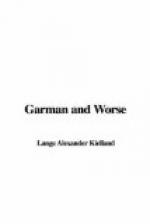“Dead!” said the minister, rising hastily from his chair. “It is most extraordinary!” He took up his hat, said good-bye, and left the room.
The woman took Marianne’s hands and folded them decently across her breast; she then put her arms under the bedclothes and straightened the legs, so that the corpse should not stiffen with the knees bent. The mouth was slightly open. She shut it, but the chin fell again. Torpander could see what the woman was looking for, and handed her his silk handkerchief. How rejoiced he was that he had not used it! The woman regarded the handkerchief suspiciously, but when she saw that it was perfectly clean, she folded it neatly and tied it round Marianne’s head.
Torpander stood gazing at the little weary face, bound round with his lovely silk handkerchief, and he felt at length as if he had some part in her. He had received her last look, her last smile, and as a reward she had accepted his first and last gift. After all, his courtship had had the best ending he could possibly have hoped for. He bent his head, and wept silently in Abraham Lincoln’s portrait.
Begmand came upstairs, and sat gazing at the body. Since the fire he had not been altogether himself.
“Shall I go to Zacharias the carpenter, and order the coffin?” asked the woman. But as she did not get any answer, she went off and ordered the coffin on her own account. It was not to be any more ornamental than was usual in the West End.
Meanwhile Pastor Martens was continuing his journey. Marianne’s death had made a most disagreeable impression upon him, which probably added to his former ill humour.
The women, both old and young, were again on the look-out for him. A clergyman was not often to be seen in West End. The boys, who had found a dead cat on the shore, and which the eldest was dragging after him, came marching along like little soldiers. Behind them followed a tiny little creature not higher than one’s knee, with his mother’s wooden shoes on his feet, and wearing a paper cap on his head. The whole band was in high spirits, and sang with a ringing voice a national air, according to the comic version which was in use in West End:
“Yes, we love
our country;
Yes, indeed
we do!
He who dares deny it,
We will
let him know!”
The pastor had to pass the children, whose song went through his head. The cat, of which he just caught a glimpse, was half putrid, and its skin was hanging in rags. Parson Martens pressed his handkerchief to his mouth; he was afraid that the unhealthy atmosphere would be injurious to his health.
He hurried out of West End and up to the house, as fast as his cassock, and having to pick his way among the dirty puddles, would allow; but he came too late. The Consul had already been dead half an hour, and so Pastor Martens turned and went back to the town. It was very hot walking in the long black garment, and already well past dinner-time.




